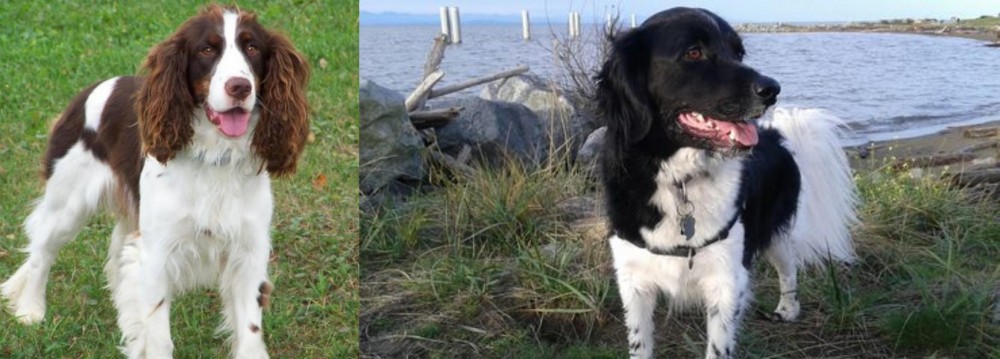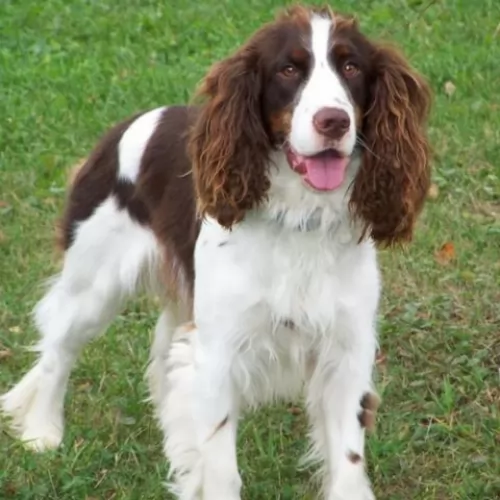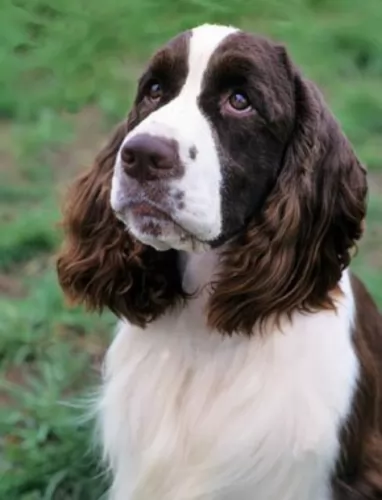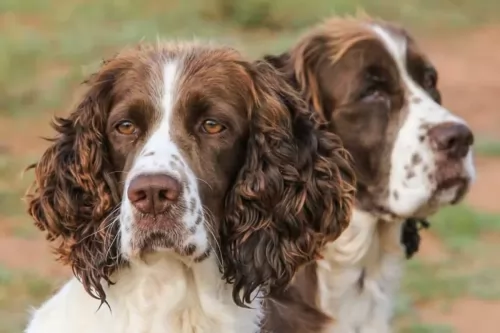 Petzlover
Petzlover English Springer Spaniel is originated from United Kingdom but Stabyhoun is originated from Denmark. Both English Springer Spaniel and Stabyhoun are having almost same height. English Springer Spaniel may weigh 25 kg / 55 pounds lesser than Stabyhoun. Both English Springer Spaniel and Stabyhoun has almost same life span. English Springer Spaniel may have more litter size than Stabyhoun. Both English Springer Spaniel and Stabyhoun requires Low Maintenance.
English Springer Spaniel is originated from United Kingdom but Stabyhoun is originated from Denmark. Both English Springer Spaniel and Stabyhoun are having almost same height. English Springer Spaniel may weigh 25 kg / 55 pounds lesser than Stabyhoun. Both English Springer Spaniel and Stabyhoun has almost same life span. English Springer Spaniel may have more litter size than Stabyhoun. Both English Springer Spaniel and Stabyhoun requires Low Maintenance.
 The English Springer Spaniel is one of many gun dog breeds that flush and retrieve. They descended from the Shropshire Spaniels and Norfolk Spaniels. The English Springer Spaniel is somewhat similar to the Welsh Springer Spaniel and believe it or not they are also closely related to the English Cocker Spaniel. In the last century the cockers and springers came from the same parents. The larger dogs flushed game and made game “spring” from the brush while the smaller dogs – the “cockers” would hunt woodcock. Eventually through specific breeding, the UKC of England recognized the “springers” as a separate breed.
The English Springer Spaniel is one of many gun dog breeds that flush and retrieve. They descended from the Shropshire Spaniels and Norfolk Spaniels. The English Springer Spaniel is somewhat similar to the Welsh Springer Spaniel and believe it or not they are also closely related to the English Cocker Spaniel. In the last century the cockers and springers came from the same parents. The larger dogs flushed game and made game “spring” from the brush while the smaller dogs – the “cockers” would hunt woodcock. Eventually through specific breeding, the UKC of England recognized the “springers” as a separate breed.
Sydenham Edwards, in 1801, proposed that the spaniels be divided into the Springing or Hawking Spaniel and the Cocking or Cocker Spaniel. From this point on there was a flourish in the development of spaniel breeds in the 19th century. They were usually named for the county in which they were founded or after the individual who developed them. In 1902, the English Springer Spaniel was officially recognized as its own breed by the UKC. It was not until 1910 that the AKC recognized them as well.
 The Stabyhoun is a near extinct breed and one of the rarest ever. He was never recognized by the major kennel clubs but was entered into Foundation Stock Services.. The breed comes from the Netherlands in the Frisian Forest and has been known since the early nineteenth century.
The Stabyhoun is a near extinct breed and one of the rarest ever. He was never recognized by the major kennel clubs but was entered into Foundation Stock Services.. The breed comes from the Netherlands in the Frisian Forest and has been known since the early nineteenth century.
It was not known outside of the Friesland Forest area until the 1960’s and outside the Netherlands only since the twenty first century. The Stabyhoun is a Dutch national treasure whose name means “stand by me dog”. Today throughout the world only a few thousand remain.
The Stabyhoun is hunter and retriever with a soft-mouth and ability to point. He was used for duck hunting and finding upland birds. He is great in the water, sharp-eyes and efficient, he works quickly. The breed has also been known to hunt fox, other birds and small game. They are great at catching moles.
Even though British breeds are more popular for hunting now, the Stabij remains an excellent all round hunter. He can track, point, and retrieve. He is also a good watchdog though his disposition is peaceful and gentle. They needed to be general all around farm dogs as farmers could only afford one dog.
They have not changed much since the 1800’s either in function or appearance. In order to get such a gentle working dog, they early Stabyhoun has been mixed with the much older and rarer breed from the same area, the Wetterhoun. This crossbreeding was stopped in 1942 in order to gain breed recognition and hope to keep either of these two rare breeds from extinction.
Today the number of Stabyhoun in the Netherlands, the United Kingdom, North America and Scandinavia are slowly but surely increasing. He is highly prized as an independent thinker and hunter, inquisitive and gentle. They are related to the Heidewachtel and the Drentsche Patrijshound.
The first Staby born in the U.S. was around 1994 and in 2017 there were thought to be over 7000 Stabyhouns in the world. They are much more popular now in Europe and North America.
 Among spaniels the English Springer is medium size and well compacted. Both the working dog and the show dog sport moderately long coats and a friendly tail. They both wear a gentle expression in their eyes. But there the commonality stops as the difference between the working English Springer Spaniel and the show line is greater in this breed than in any other. The gene pools have become almost separate over the last 70 years. If you put a field dog in the show ring they would not be able to compete. If you put a show line English Springer in the field, they would not have the stamina or speed for field trials.
Among spaniels the English Springer is medium size and well compacted. Both the working dog and the show dog sport moderately long coats and a friendly tail. They both wear a gentle expression in their eyes. But there the commonality stops as the difference between the working English Springer Spaniel and the show line is greater in this breed than in any other. The gene pools have become almost separate over the last 70 years. If you put a field dog in the show ring they would not be able to compete. If you put a show line English Springer in the field, they would not have the stamina or speed for field trials.
The field line has a coarser coat and less pendulous ears. They may dock a few inches off the tail, and they are much scruffier than the show dogs. On the other hand, the show dogs have dewlaps, pendant ears and dangling flews. They are heavier and thicker than the field dog. They have long muzzles, not so prominent eyes and docked tails. The English Springer Spaniel stands tall and proud, coming from an ancient line of Spaniels
 The Staby are powerful soft-mouthed pointers who are not too fine or too robust with tightly fitting skin. Their chest, legs, collar and tail are feathered and make the dog look like a longhaired canine, but she really is not. The dog is longer than it is tall, and his head is longer than it is wide. Most of the breed are black and white but there are many brown and white, while the orange and white are very close to extinction.
The Staby are powerful soft-mouthed pointers who are not too fine or too robust with tightly fitting skin. Their chest, legs, collar and tail are feathered and make the dog look like a longhaired canine, but she really is not. The dog is longer than it is tall, and his head is longer than it is wide. Most of the breed are black and white but there are many brown and white, while the orange and white are very close to extinction.
They have a slightly domed skull and a slightly arched but strong neck. Their muzzle is broad and the bridge straight while the nose is well developed. With medium sized ears, set low on the head and having the bottom third of the ears covered with hair. The eyes are round, medium sized and level in the head
They have a long sleek coat with a slightly wavy croup. They are never curly. Its back is straight, tail long and loin powerful.
 The English Springer Spaniel is a friendly dog who loves to please his people. They are great family dogs, easy-going and affectionate. In addition, they are attentive and alert which makes them such great hunting dogs. With exceptional speed and stamina, he needs activity to stimulate his body and brain. He is very intelligent. That intelligence can lead to stubbornness as well. He’d great with kids and good with other pets with perhaps the exception of cats. The breed is in love with water and will get in at any time.
The English Springer Spaniel is a friendly dog who loves to please his people. They are great family dogs, easy-going and affectionate. In addition, they are attentive and alert which makes them such great hunting dogs. With exceptional speed and stamina, he needs activity to stimulate his body and brain. He is very intelligent. That intelligence can lead to stubbornness as well. He’d great with kids and good with other pets with perhaps the exception of cats. The breed is in love with water and will get in at any time.
 Not an uncommon issue for most medium to smaller sized dogs. It can lead to lameness or arthritis.
Not an uncommon issue for most medium to smaller sized dogs. It can lead to lameness or arthritis.
Loss of vision due to a deterioration of the retina.
Clubs form in the retinal tissue and can lead to blindness.
The twisting or distention of the stomach that effects dogs with deep chests and can lead to death if not treated immediately.
 Though an isolated, rare breed for so long, the Stabyhoun does have several known health issues including:
Though an isolated, rare breed for so long, the Stabyhoun does have several known health issues including:
• PDA or Patient Ductus Arteriosis – heart issue from 6 weeks on. Major vessel does not close. With surgery it can be corrected.
• Type 1 von Willebrand’s Disease (vWB) – a bleeding disorder in its mildest form. DNA testing is available not required.
• Cerebral dysfunction – rare compulsive behavior at 6 weeks. It is fatal at this point. DNA testing will be required.
 The English Springer Spaniel can gain weight easily and obesity is one of the biggest health issues for this breed. Feed them a high quality dry dog food. Working dogs need more energy and more calories than the inactive dog. An active member of the breed should have around 1353 calories every day in at least 2 meals if not 3. Do not feed a large meal before or after strenuous exercise as this can cause bloat.
The English Springer Spaniel can gain weight easily and obesity is one of the biggest health issues for this breed. Feed them a high quality dry dog food. Working dogs need more energy and more calories than the inactive dog. An active member of the breed should have around 1353 calories every day in at least 2 meals if not 3. Do not feed a large meal before or after strenuous exercise as this can cause bloat.
In addition to the health issues listed above the English Springer Spaniel is also prone to:
This is a genetic condition where the body cannot use the carbohydrates it takes in and convert it to energy. This is identified as a blood disorder.
Causes seizures but can be treated with medications.
With longer , droopy ears, infection is always a possibility. Clean them regularly and keep them dry.
The working English Springer Spaniel is a very energetic dog requiring daily exercise and loving to play. They love walks and hikes. They can excel in competitions such as rally, agility, tracking, field and obedience.
 1Feeding the puppy -They are prone to obesity. Do not overfeed. Watch calories. Feed a high quality dog food meant for active medium sized dogs in 3-4 meals per day.
1Feeding the puppy -They are prone to obesity. Do not overfeed. Watch calories. Feed a high quality dog food meant for active medium sized dogs in 3-4 meals per day.
2.Feeding the adult – Feed a high quality dog for medium sized dogs in 2-3 meals per day.
An active dog that needs exercise. They need mental stimulation as much or more than they need physical. Don’t skimp on either. They love agility, field trials, lure coursing, and scent training. They also love the triathlon, frisbee and endurance.